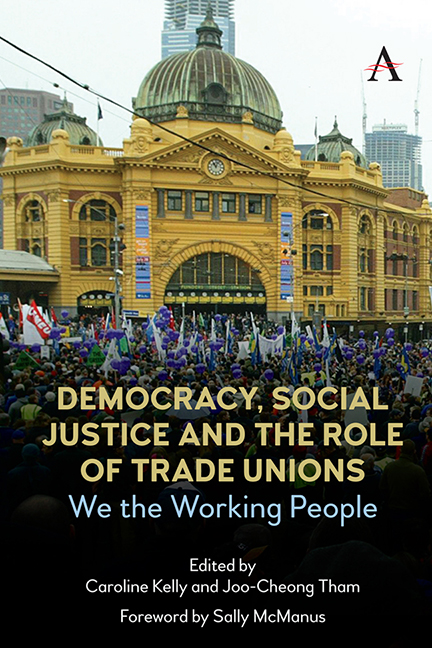Book contents
- Frontmatter
- Contents
- Foreword
- Acknowledgements
- Chapter 1 Democracy and Social Justice as Organising Principles
- Chapter 2 Economic Democracy, Workers and Unions
- Chapter 3 Nobody Owns the Future
- Chapter 4 Regulatory Approaches to the Internal Affairs of Trade Unions in Australia: From Democratic Control to Corporate Accountability
- Chapter 5 Trade Unions and the Regulation of Election Funding: Between Libertarianism and Egalitarianism
- Chapter 6 Trade Unions and Precarious Work: In Search of Effective Strategies
- Chapter 7 ‘Is There an App for That?’ Worker Representation, Unions and the Gig Economy
- Chapter 8 Temporary Migrant Workers and Trade Unions in Australia: A Complex Relationship
- Chapter 9 Unions, Fossil Fuel Exports and a Just Transition
- Chapter 10 Trade Agreements, Labour Rights and Democracy
- Chapter 11 Trade Unions, Labour Law and Democratic Socialism: The COVID-19 Crisis in the United Kingdom
- Notes on Contributors
- Index
Chapter 8 - Temporary Migrant Workers and Trade Unions in Australia: A Complex Relationship
Published online by Cambridge University Press: 18 November 2021
- Frontmatter
- Contents
- Foreword
- Acknowledgements
- Chapter 1 Democracy and Social Justice as Organising Principles
- Chapter 2 Economic Democracy, Workers and Unions
- Chapter 3 Nobody Owns the Future
- Chapter 4 Regulatory Approaches to the Internal Affairs of Trade Unions in Australia: From Democratic Control to Corporate Accountability
- Chapter 5 Trade Unions and the Regulation of Election Funding: Between Libertarianism and Egalitarianism
- Chapter 6 Trade Unions and Precarious Work: In Search of Effective Strategies
- Chapter 7 ‘Is There an App for That?’ Worker Representation, Unions and the Gig Economy
- Chapter 8 Temporary Migrant Workers and Trade Unions in Australia: A Complex Relationship
- Chapter 9 Unions, Fossil Fuel Exports and a Just Transition
- Chapter 10 Trade Agreements, Labour Rights and Democracy
- Chapter 11 Trade Unions, Labour Law and Democratic Socialism: The COVID-19 Crisis in the United Kingdom
- Notes on Contributors
- Index
Summary
Both globally and within Australia, there has been an acute transformation of labour markets characterised by the fragmentation of work and organisations and the growth in non-standard employment arrangements. This is evidenced in the segmentation of labour markets, the casualisation of workforces and the triangulation of work arrangements. Temporary labour migration is now an embedded feature of many labour markets, and Australia is no exception, with visa holders constituting at least one-tenth of the Australian labour force. This chapter highlights these changes and challenges, through examining the complex relationship between trade unionism and temporary labour migration in Australia. It shows how trade unions that have been traditionally most active in the regulation of standard employment now have to adapt to representing the interests of a more flexible and less homogeneous group of workers, and they have to do so without straining relationships with their traditional rankand-file membership in traditional jobs and industries. In this context, there is an urgent need for unions to engage with temporary migrant workers. This group of workers has been shown to be particularly vulnerable to precarious work and the wages and conditions received by this group of workers has farreaching effects on all workers in the labour market.
This chapter begins by examining the complex relationship between trade unionism and temporary labour migration in Australia. It exposes a concerning paradox: although temporary migrant workers need unions more than most other cohorts of workers and face far greater barriers in joining them and accessing their help, Australian unions, with a few notable exceptions, have been largely unsuccessful in recruiting temporary migrants as members and representing their interests. This chapter then turns to a case study of the role of unions in the Australian horticulture industry and focuses on unions’ new approaches under changed conditions in this industry. Temporary migrant workers on a range of visas are the mainstay of the horticulture industry’s workforce, and unions have adopted new approaches to organising these workers and advocating for changes to government policy and regulation to better suit their interests.
Labour laws and policies, through recognising and supporting the work of trade unions, are vital for remedying the unequal footing of workers when negotiating with employers.
- Type
- Chapter
- Information
- Democracy, Social Justice and the Role of Trade UnionsWe the Working People, pp. 139 - 154Publisher: Anthem PressPrint publication year: 2021

